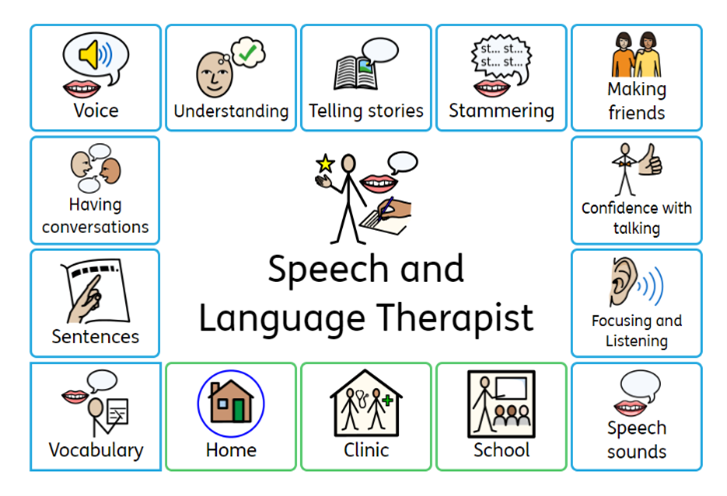Children's Speech and Language Therapy

What is Children’s Speech and Language Therapy?
Speech and language therapists (SLTs) work with children aged 0-19 years who have communication and/or feeding and swallowing difficulties across Calderdale and South Kirklees. These children may experience difficulties in the following areas:
-
Listening to and understanding words/instructions
-
Talking in words and sentences
-
Using clear speech
-
Social communication and interaction
-
Fluent speech (stammering)
-
Eating, drinking & swallowing
There are many reasons why children may have such difficulties, and they can be as a result of conditions including language delay/disorder, speech sound difficulties, learning disabilities, stammering, autism, hearing impairment and physical difficulties.
If you feel a child or young person would benefit for support for any of the areas above, see the ‘how to refer’ tab below for further information and contact detail for the Children Speech and Language therapy service.

Our team
Within our service, children and young people are supported through dedicated care pathways with a team of therapist and therapy assistant provide direct and indirect support, tailored to the needs identified during their referral and assessment. Each pathway is evidence-based and designed to provide the most appropriate support for the individual.
Our specialist teams include:
-
Clinic team
-
Special Educations Needs (SEN) Pathway - CHFT
-
Social Communication team
-
Stammer team
-
Youth Justice team
-
Eating, Drinking and Swallowing team
-
Service Level agreement team (SLA)
Please note, children and young people may access a number pathway throughout their journey and level of need. Each team page provides further details on the children and young people who may benefit from these pathways, along with strategies, resources, and advice for families and professionals.
To learn more about the journey your child and young person may experience through our service, please visit the ‘What to Expect’ section below and the pathway specific pages.

How to refer
If you have concerns around your child's speech and language or communication needs, they may need a referral into our speech and language team. We accept referrals from parents, schools and other health professionals. All referrals should be made using Making a referral - CHFT
For referrals for Eating, Drinking and Swallowing referral via the Dysphagia referral form
If you have any queries about new referrals or child/young people that have already been referral to the service, you can contact via telephone:
-
Halifax Admin: 01422 261340
-
Huddersfield Admin: 01484 344299.
You can also contact via email on cah-tr.childrenstherapy@nhs.net.
If you are a professional, see the ‘For professionals’ tab for information, advice and strategies to support child and young people with their speech, language and communication skills.
What to expect
As a service, we work collaboratively with the adults around a child or young person to create joint targets to support their speech, language, and communication development.
We currently implement ‘episodes of care’ which means your child accessing the service will receive appropriate means of assessment and intervention. Once all appropriate targets, advice and strategies are in place your child will be discharged from the therapist’s caseload with clear re-access information if further support and guidance is needed to support your child following this.
What is re-access?
Once a child or young person has completed their speech and language therapy and is discharged, there may be times when further support is needed. Re-access allows them to return to the service without having to start the entire process from the beginning.
Re-access may be appropriate if:
- New speech, language, or communication needs arise.
- An existing difficulty changes or becomes more significant.
- All targets have been achieved.
- Developmental milestones highlight additional areas of concern.
- A school, health professional, or parent/carer identifies that further support is required.
The exact process for re-access will be outlined on your child’s care plan along with the appropriate paperwork. Families can re-access along with professional such as a GP, teacher, or health visitor. Children will usually be re-assessed to ensure the most suitable pathway of support is offered.
For professionals
If you’re a professional working with children who need additional support with their speech, language and communication development you will find details here on how to access support and how to refer into our service.
Due to high levels of referrals and long waiting lists, we ask you to please use the resources offered and follow our referral criteria and ‘how to refer’ information ahead of referring a child to us.
Useful resources
Local area support:
Speech and Lanauge support pages:
- Speech and language UK – advice line for parents and carers and ‘talking with your toddler’ webinar series.
- Afasic Helpline for parents – a ‘listening ear’, no query too small or silly
Support for pre-school children
- Tiny Happy People- Offers a range of advice, tips and activites that you can use to boost children, speech, langauge and communication skills. Also suports with other elements of development such as play skills, sleep, toileting ect...
Support for Children with SEND
- National Autistic Society – offers a range of resources and advice, working to transform lives and change attitudes to help create a society that works for autistic people to support child and young people with their speech, language and communication skills.
